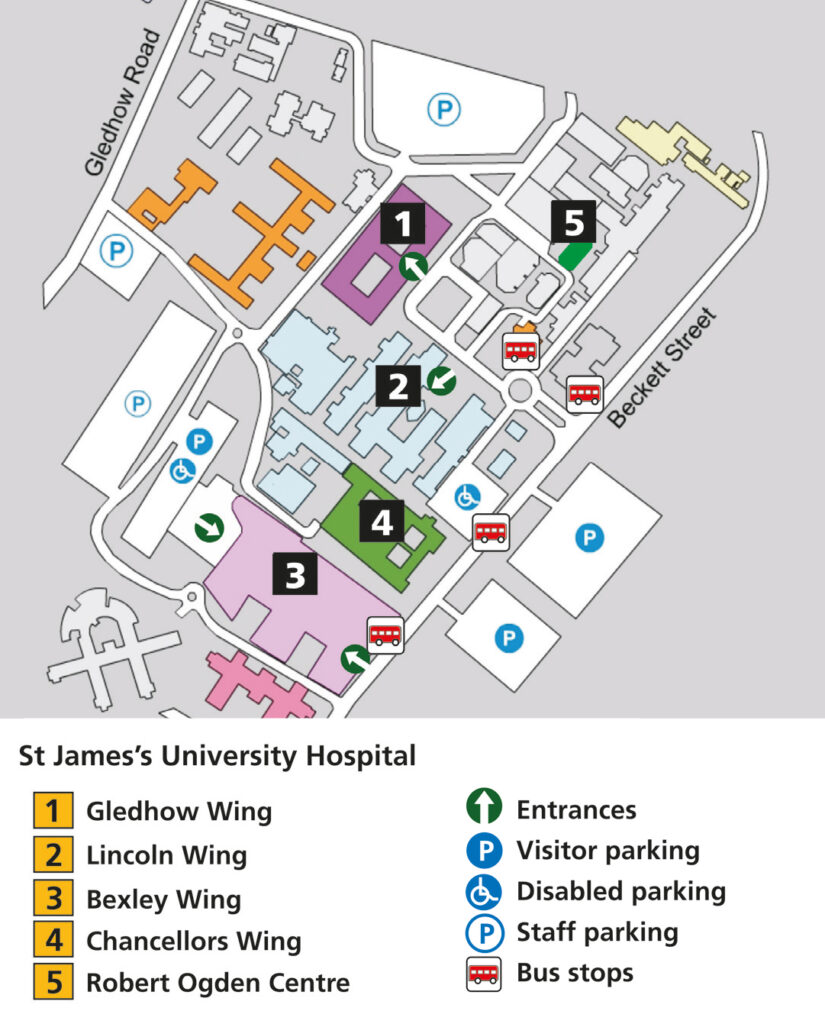This leaflet aims to help you and your family understand more about your radiotherapy treatment to your prostate gland.
This leaflet will be given in addition to the information you will receive from your clinical oncologist or consultant radiographer (who are specialists in cancer treatment). His/her team will be caring for you during your treatment. This team will include radiographers and clinical nurse specialists but may also include social workers, physiotherapists, occupational therapists and dietitians.
The leaflet describes radiotherapy planning and treatment. It also explains the side-effects which you may experience during and after treatment.
Each person’s treatment will vary, so the information given is a general guide. The healthcare team looking after you will explain your treatment and the side-effects in detail. If you have any questions after reading this leaflet, please speak to the team looking after you or ring the numbers at the end of the leaflet. Staff will make every effort to meet your individual needs or will direct you to the person who can help.
All your radiotherapy planning and treatment will take place in the Radiotherapy Department on Level -2, Bexley Wing, Leeds Cancer Centre, St James’ University Hospital, Beckett Street, Leeds, LS9 7TF.
Please do not
Bring any valuables into hospital with you as the Trust cannot accept liability for loss or theft.
What is radiotherapy?
Radiotherapy is the use of high energy X-rays and other types of radiation to treat cancer.
Radiotherapy causes damage to the cancer cells in the treated area. Although normal cells are also affected, they can repair themselves and are able to recover. Radiotherapy is a local treatment. This means it only affects the part of the body that is being treated. When you are having radiotherapy you do not feel anything and it does not make you radioactive. You may hear a buzzing noise when the machine is switched on.
It is perfectly safe for you to be around others, including children and anyone who may be pregnant, throughout your treatment. You will have your radiotherapy on a treatment machine called a ‘Linear Accelerator’ as shown here.
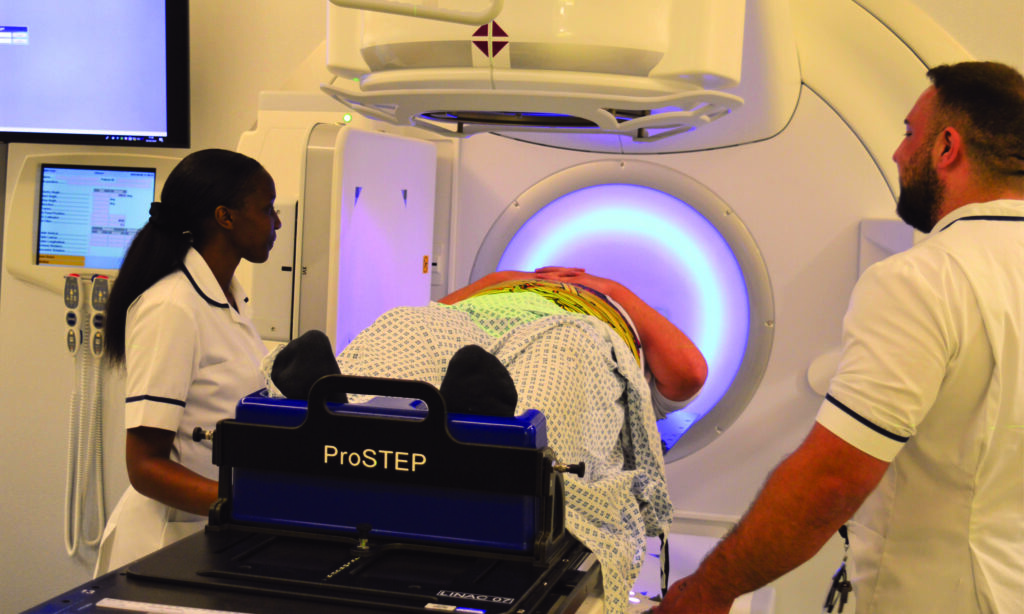
You will see your radiographers at each treatment session, and they will be happy to answer any questions you may have.
How often is it given?
A course of treatment may last from 2-4 weeks. Your specialist will decide how long it will be and whether your treatment is given every day (Monday to Friday) or every other day. If it is given daily, your treatment may not start on a Monday; it can be any other weekday.
Sometimes weekly (once a week) treatment is given over 6 weeks. Again, this will be discussed with you when you speak with your clinical oncologist or consultant radiographer.
Whenever possible you will be treated at the time of day that suits you, but this cannot always be arranged or guaranteed.
You may need to be treated on a weekend during the day due to a bank holiday and we will let you know if this is the case. Your radiographer will be able to explain the details of your individual radiotherapy appointments. Your treatment will usually be given as an outpatient.
Visiting us before your treatment
If you would like to visit the radiotherapy department before starting treatment, please call 0113 206 7603. This visit can be very useful as you can find out more information about radiotherapy.
Who will I meet?
Therapeutic radiographers
Radiotherapy is given by therapeutic radiographers of any gender, who are highly trained in the accurate planning and delivery of radiotherapy treatment. You will see your radiographers at each treatment session and they will be happy to answer any questions you may have.
Student radiographers
The radiotherapy department is a training centre for therapeutic radiographers. They are supervised at all times. If you do not wish students to be present, please speak to a member of staff. This will not affect your treatment or care.
Others involved in your care
You may meet other staff whilst you are coming for radiotherapy. Everyone you meet will introduce themselves, tell you their job title and explain the role they have in your care.
Important advice before your treatment
If you are still sexually active you should avoid unprotected sex with anyone who could become pregnant, during and after your treatment. This is because sperm can become damaged by radiotherapy. This could lead to an increased risk in miscarriage or an increased rate of abnormality in children conceived during and after radiotherapy. If you have not completed your family then sperm banking is recommended, before you start radiotherapy. Please speak to your clinical oncologist (doctor) / consultant radiographer for more information.
Planning your treatment
Your first appointment for radiotherapy will be a planning appointment. This will be used to gather all the information we need to accurately plan your treatment. We will contact you by phone, with an appointment for your radiotherapy planning session. Directions to the hospital and transport arrangements will be discussed with you at this point.
Some tests and scans may be needed to help plan your treatment. We will explain which of these you will need when your appointment is made.
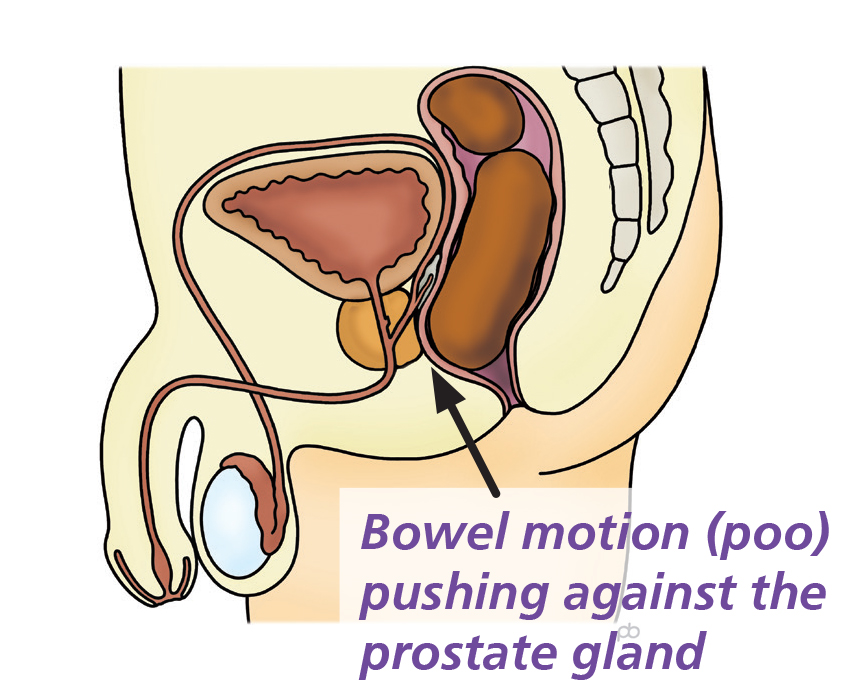
Your planning visit could take 1-2 hours to complete. The treatment is carefully planned to your own prostate shape, a technique called ‘conformal radiotherapy’. In order to plan your treatment it is important to open your bowels (have a poo) on a regular basis. This is because too much poo or gas could push your prostate gland forwards, see above picture. Irregular bowel movements may result in you having to return for a further scan. You may see your clinical oncologist / consultant radiographer (or a member of their team) at this appointment. This is an ideal opportunity for you to ask questions. If you have not previously consented to your treatment you will be asked to sign a consent form.
What to bring with you:
- A list of all questions you may have;
- An up-to-date list of all the medications you are taking (including inhalers, sprays, vitamins or herbal products);
- Any medication that you may need during your visit;
- Something to eat and drink and something to occupy yourself with, as this first visit can be quite lengthy (around two hours).
Your planning scan
In order to plan your treatment you will have a planning CT scan. This is done on a machine called a CT Scanner, shown here in the photograph.
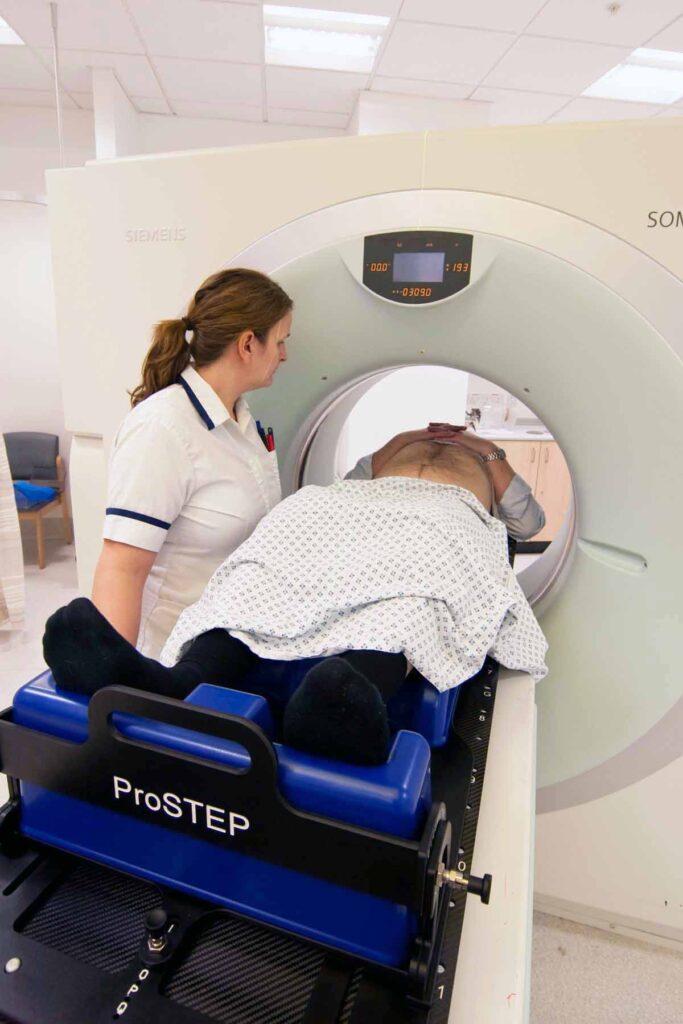
It allows the images from the scan to be sent to the radiotherapy computer planning system. There will be several members of staff present at your scan. These will include therapeutic radiographers, and possibly a a dosimetrist (the person who will produce the computer plan for your treatment).
Before your planning scan a radiographer will talk to you about bowel and bladder preparation. This may (but not always) involve the use of a ‘micro enema’. You will be given a leaflet to explain this.
Please note
Planning scans are not diagnostic examinations and will not be reported on as such.
It is important to have an empty back passage and a comfortably full bladder, both for your planning scan and during treatment. This is to ensure the accuracy of the treatment planning and delivery. If you struggle to keep your bladder full (you feel the need to wee often) please tell the radiographer.
Important information about taking your Microenemas
If you have been asked to use an enema, please note the following: Only use the
Microenemas on the days you are having radiotherapy. You do not need to
use the Microenemas on a weekend unless you are having a treatment session.
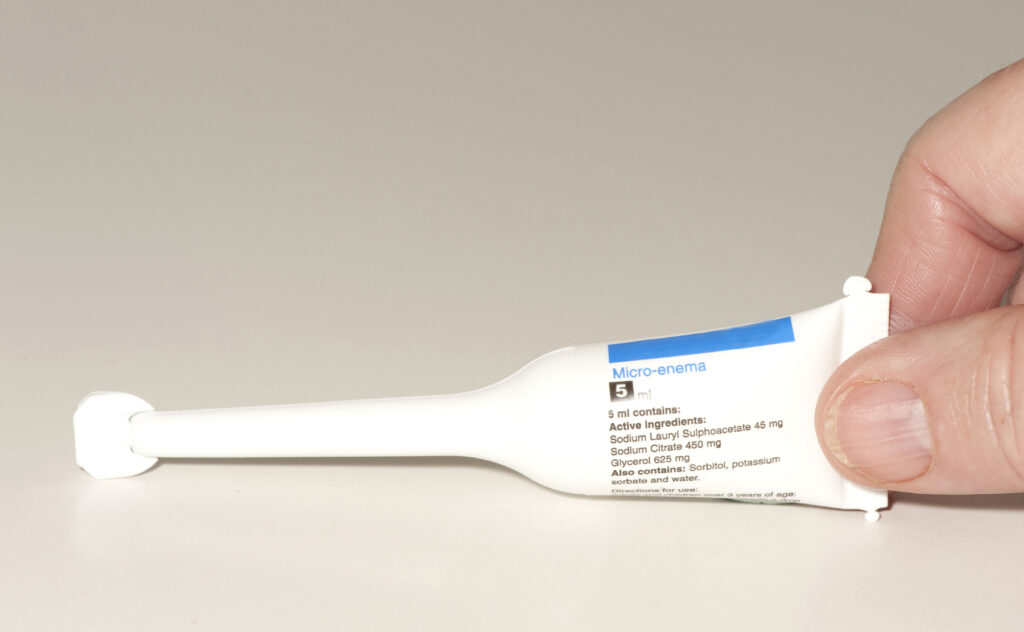
Please tell your radiographer if you are having frequent or loose bowel movements.
If you are taking laxatives for constipation please tell the radiographers when you come for your planning scan.
You will be asked to remove your clothes from the waist down athough you will be given a gown to wear. The scan will be taken with you lying in the same position as for your treatment. The radiographers will draw some marks on you, to be used as a reference for your treatment.
You will then be scanned, which will only take a few minutes and at the end of the scan these marks will be replaced by permanent marks (tattoo).
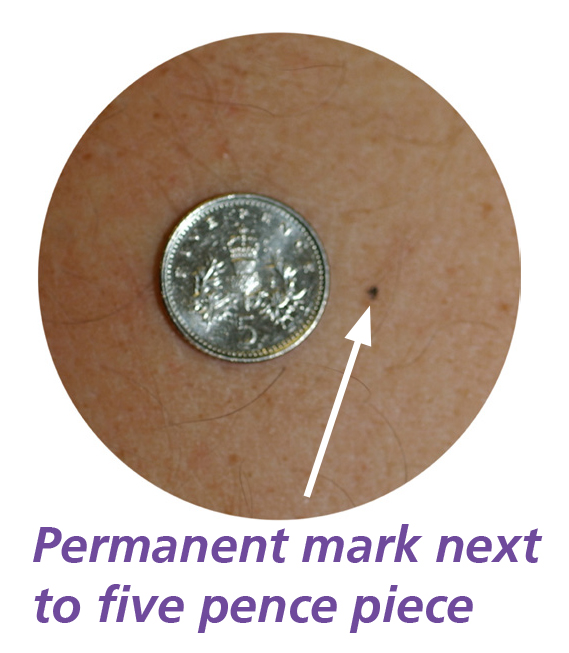
These permanent marks help us to ensure that you are in the same position each day. It also means that you can wash without worrying about your marks coming off.
You will be able to drive your car or go to work after your scan.
MRI Planning scan
Sometimes an MRI scan may also be required to help plan your Radiotherapy. This usually takes place on a different day to your CT scan. Because the MRI scanner contains a large magnet, we need to ask you some questions, before you go in to the scanner room. to make sure that it safe for you. You will need to remove any items that contain metal for the scan.
You will lie in the same position that you will have your treatment in. We will give you some earplugs and headphones to wear as the scanner can be quite noisy. The MRI scan can take up to an hour.
Following the scan(s) the radiographers will give you the time of your first treatment appointment; this is most likely to be a couple of weeks after the planning visit. The radiographers will talk to you about any further appointments you have. This includes a phone call a day or so before you start treatment. A radiographer will make sure you know what is happening, or what to expect on day 1.
There may be occasions when you may have a longer stay in the department or be asked to attend at a different time, for example to see your oncologist / consultant radiographer.
Having your treatment
When you arrive for your treatment you should go to the radiotherapy main reception desk at the entrance of the radiotherapy department. On the first occasion you will be given all your appointments on a letter. You will then be escorted to the waiting area for your machine.
The radiographers there will explain what will happen, including your bowel and bladder preparation and answer any questions that you may have. You will need to undress from the waist down, the radiographers discuss this with you when you first attend the department. The radiographers will position you, and adjust the treatment couch and machine to the correct positions.
For the first few treatments and also intermittently during treatment we will also take images to check the accuracy of the treatment. This will take a few more minutes.
Please note
These images do not monitor your condition but are purely for treatment accuracy.
You will be asked to stay as still as possible during the treatment but you should breathe and swallow normally.
Once you are in the correct position the radiographers will leave the room to switch on the machine. You will only be alone for a few moments at a time. The radiographers will be watching you on a closed circuit TV (CCTV) monitor during treatment.
The CCTV camera is not recording or saving any images. There is also an intercom system so the radiographers can talk to you.
The treatment only takes a few minutes but you will be in the treatment room for about 5-10 minutes. The machine stops automatically after your prescribed dose of treatment has been given. The radiographers can stop the machine at any time if needed. The treatment machine makes a buzzing sound when switched on. You do not feel anything.
The radiographers may need to come in and out part way through each treatment.
After the treatment is complete the radiographers will come back into the room and help you off the couch.
On some days the radiotherapy department may be busy and there may be a delay before your treatment. We will keep you informed of any delays over 30 minutes, please see the delay signs in the waiting areas. It may be a good idea to bring something to eat and drink with you, including any supplement drinks you have been asked to have and any medication you may need. There is a restaurant and café available on Level 0.
Please note
It is very important that you do not miss treatment days as it may make your treatment less effective. If you feel you are unable to attend for any reason please telephone us so that we can discuss this with you. If you have any queries about your appointment times please discuss these with the radiotherapy co-ordinators on your treatment unit.
What if I have any problems?
During your course of treatment, please tell the radiographers how you are feeling. If you have any problems or questions, please let them know. Your clinical oncologist / consultant radiographer, nurse specialist or a member of their team will see or ring you during your treatment in the Princess Royal Suite. They will monitor any side-effects you may be experiencing. You can expect to be in the department longer than usual on this day.
Diet information
In order to improve treatment accuracy, it is important that your bowels are opened (that you have a poo) on a regular basis. If you suffer from an irregular bowel habit it is important to let your radiographer or nurse know.
Occasionally people develop the urge to have their bowels opened without passing anything (this is called ‘tenesmus’), whilst others may find opening their bowels becomes painful. If you experience any difficulties please inform your radiographer, doctor or nurse. It is also helpful during your treatment to try and reduce any wind or gas in your bowel.
The following suggestions can help:
- Eat foods slowly and chew foods well, with your mouth closed.
- Don’t talk whilst you are eating.
- Drink slowly – sip drinks rather than gulping them, especially when you are taking tablets.
- Avoid using straws or drinking directly from a bottle.
- Avoid carbonated (fizzy) drinks such as soda water, cola, lemonade.
- Eat in a relaxed atmosphere.
- Avoid chewing gum or smoking.
- Light physical activity each day for example. Walking may help.
- If you know certain foods cause you to become ‘windy’, please avoid them.
Fluid
Why is fluid important?
Water is essential for life. We need water to get rid of waste products from the body, keep our skin healthy and replace water lost through breathing and sweating.
Drinking the recommended amount of fluid each day will help to keep your bladder healthy.
What happens if I don’t drink enough?
If you do not drink enough fluid each day you can become dehydrated.
This can cause:
- Tiredness
- Nausea (feeling sick)
- Light-headedness
- Irritability
- Constipation
- Headaches
- Dry skin and mouth
- Your urine (‘wee’) will also become concentrated, dark in colour and have a strong smell.
How much fluid should I drink each day?
During your treatment you will need to drink about two litres of fluid each day. This is the same as 3½ pints or about eight glasses.
Please note
If you have a kidney problem and drinking this amount of fluid would be difficult for you please inform your radiographer, nurse or doctor.
Your doctor, nurse or radiographer may advise you to drink more as your treatment progresses. They will talk to you individually about this.
What types of fluid are best to drink?
The best types of fluid to drink during your treatment are water, milk, squash, decaffeinated tea and decaffeinated coffee. All alcoholic drinks irritate the bladder during treatment so try and avoid drinking these. Caffeine also irritates the bladder during treatment. Try and cut down on tea and coffee and replace with decaffeinated varieties, squash, water etc.
Please note
Occasionally fruit juices can interfere with the way some medicines work. If you want to drink cranberry juice, please discuss this first with your doctor or pharmacist.
Fluid is particularly important during your radiotherapy treatment. It can help prevent constipation, keep your bowels opening regularly and maintain the position of your prostate.
Fibre
What is fibre?
Fibre is the part of food that the body cannot break down. As fibre passes through the bowels it absorbs water, like a sponge and makes the contents of your bowels soft and bulky. This helps the muscles in the walls of your bowel to work better and helps food to pass through your gut. When the diet is low in fibre, the gut struggles to work well and this can lead to constipation. A diet containing fibre can help your bowels empty more regularly.
Fibre comes from three main sources:
- Fruit
- Vegetables
- Wholegrain Cereals
Should I eat fibre during my treatment?
Yes! It is important to eat foods containing fibre as part of your diet during your treatment, in order to keep your bowels opening regularly. Fibre also has other health benefits including:
- Reduces the risk of heart disease and colon cancer
- Keeps the inside of your bowels healthy
- Prevents constipation
Foods containing fibre
| Lower fibre | Higher fibre |
| Breakfast cereals Cornflakes, Rice Krispies, sugar coated cereals. | Breakfast cereals Wholegrain varieties such as, Branflakes, Shredded Wheat, Weetabix, porridge and muesli. |
| Bread White bread or brown bread. | Bread Wholemeal or granary bread, wholemeal pitta bread or chapattis. |
| Pasta and Rice White pasta or white rice. | Pasta and Rice Wholemeal pasta or wholegrain / brown rice. |
| Biscuits and Crackers Cream crackers, crispbreads, biscuits made with white flour. | Biscuits and Crackers Wholemeal crackers and crispbreads, oatcakes. |
| Fruit and Vegetables Mashed / boiled potatoes with skins removed. Fruit juice. | Fruit and Vegetables Jacket and new potatoes with skins left on. All vegetables. All fruit (fresh, canned). |
It is important to drink plenty of fluid when your diet contains fibre. Drinking too little fluid when your diet contains fibre can lead to constipation. Try and drink at least eight glasses of fluid each day. This is the same as two litres or 3½ pints.
If you develop diarrhoea (loose watery poo) you will need to drink more fluids to replace those lost. Your doctor or nurse can advise you further on this.
Dietary recommendations may change if you develop significant bowel irritation. Your doctor or nurse specialist will be able to advise you further.
Please note
The information about diet in this leaflet provides general guidance and ideas only. If you are experiencing a poor appetite, weight loss or problems eating, please let your doctor, nurse or radiographer know. They will be able to give you further guidance.
Side-effects of treatment
Short term side-effects from radiotherapy
As your treatment progresses you may experience some side- effects. Not everyone will experience all of these reactions.
If you do experience any of the following side-effects, do not worry, they are normal reactions to treatment and are temporary. They usually begin about half way through the course of treatment, may last for several weeks after it has finished and then slowly settle down.
You will see your radiographers every day, if you notice any of the following problems please tell them straight away and they will contact the doctor or nurse for you. Treatment to ease these side-effects is often available.
Urinary problems
- You may find you have to pass urine (wee) more often than usual. This may be accompanied by a burning sensation (called ‘cystitis’), which is treatable. Drinking the recommended amount of fluid each day will help to keep your bladder healthy.
- You may notice that you have to get up more frequently during the night to pass urine. Continue to drink the recommended amount through the day but avoid drinking too much during the evening.
- Side-effects usually settle within three to four weeks after treatment. Continuing to follow the recommended advice after treatment will help you cope with your side-effects.
- It is common for people to notice small particles (bits) in their urine. This is due to the radiotherapy and is not serious. Please tell us if you notice any blood in your urine.
- On occasion people may find it difficult to pass urine, or may have a decreased flow of urine. This may need other treatments.
- Discomfort in the lower abdomen (lower tummy) along with only passing a few dribbles of urine or being unable to pass urine at all, may mean you have urinary retention. This is extremely rare.
Important
Urinary retention is serious. If this happens during the evening or at the weekend, you should attend your local A&E department. You may need to have a catheter inserted.
Diarrhoea
Radiotherapy to the pelvis sometimes irritates the bowel and may cause diarrhoea (loose watery poo). You may also experience wind and/or stomach cramps. These symptoms may occur a week or two after starting treatment and may continue for some weeks after radiotherapy is complete.
If you experience diarrhoea during your treatment please tell your radiographers straight away. You will need to stop using your Microenemas if you start with diarrhoea.
If you develop diarrhoea you will need to drink more fluids to replace those lost. You should try to maintain a healthy balanced diet throughout your treatment.
Piles (haemorrhoids)
For some patients, who have had a history of piles, radiotherapy can cause this problem to flare up again. Please do not use any preparations you may have at home for this problem as certain creams may interfere with your radiotherapy treatment.
Please ask your treatment team for advice about suitable medication.
Abdominal pain (colic)
It is rare to feel abdominal (tummy) discomfort and colicky pains but you may feel ‘bloated’ and swollen. If you experience any of these side-effects please inform your radiographer, doctor or nurse.
Skin reactions
The skin in the treated area may start to redden or darken around 10 days after starting your radiotherapy. It may become dry and itchy. Before you start your treatment, a radiographer will explain what could happen to your skin and how to look after it. They will also give you a leaflet to take home.
Avoid hair removal in the treatment area where possible. This includes shaving, waxing, cream and lasers unless advised otherwise by your consultant, nurse or radiographer.
Pubic hair loss
Radiotherapy may make your pubic hair (the hair around your genitals) fall out. The hair may grow back after treatment is completed but it may appear thinner or finer than before treatment.
Tiredness (fatigue)
Nearly all patients having radiotherapy will feel tired. Be prepared to take things easy during treatment and allow for extra rests.
Fatigue usually improves in the weeks to months after treatment.
Things you can do to help include:
- Gentle exercise can help reduce the symptoms of fatigue.
- Having enough to drink can prevent tiredness from dehydration.
- Small meals or snacks eaten more often than three times a day may be easier to face.
- Try to get a good night’s sleep where possible, a daytime nap may help.
- Try to ‘pace’ yourself, listen to what your body is telling you, rest if you need to.
- Pick out the things that you enjoy, and try to accept help with other tasks.
- Little and often is the rule of thumb.
There is a Macmillan information leaflet available. If you would like a copy, or support with your fatigue please ask a member of staff.
Long term side-effects
The following side-effects are rare, but it is a good idea to know what to look out for. They may happen some months or years after completion of treatment.
Bowel frequency
It is usual to find you have a slight increase in bowel movements over a period of time (pooing more often). Rarely, there may be mucus and/or blood in your motions. It is important to inform your Clinical Oncologist / consultant radiographer if this happens, as further investigations may be required. Inflammation of the lining of the back passage (called ‘proctitis’) may develop as a result of radiotherapy and may need to be treated.
Bladder problems
Because the prostate gland surrounds the base of the bladder, the radiation dose to this area is the same as in the prostate. This sometimes leads to a thinning of the lining of the bladder and on rare occasions blood appears in the urine. If this happens it may need further investigations. Please inform your doctor, consultant radiographer, nurse or GP.
Macmillan toilet card
If you want to go to the toilet more often, or feel that you can’t wait when you do want to go, you can get a card to show to staff in shops, pubs and other places. The card allows you to use their toilet without staff asking awkward questions.
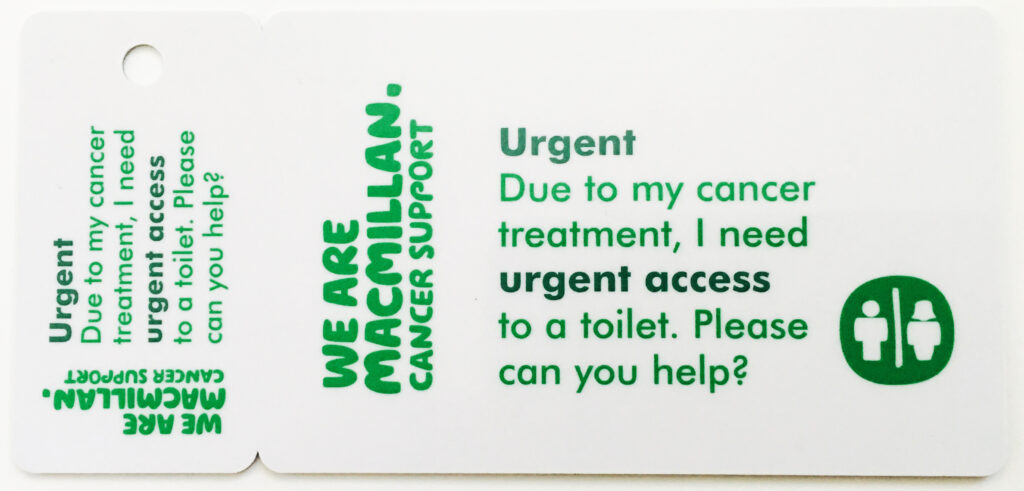
You can get the cards from your radiographer or information lounge in the department.
Erectile dysfunction
Radiotherapy to the prostate can cause erectile dysfunction, which is the inability to get and maintain an erection. If this happens it will be some months after your treatment has finished. If this is a problem for you then you should discuss this with your clinical oncologist (doctor) / consultant radiographer or urologist as there are a number of treatments which may help.
Seminal fluid (semen)
You may find that your seminal fluid (ejaculate/semen) is of a smaller volume or that no ejaculate comes out at all when you have an orgasm. This is known as a ‘dry orgasm’. It is safe for you to have sex with your partner – you won’t pass on your cancer or any radiation. If you or your partner have any further concerns or questions of an intimate nature, please speak to your clinical oncologist (doctor), consultant radiographer or Clinical Nurse Specialist. They can provide a confidential discussion and advice.
Infertility
Radiotherapy to the prostate is likely to cause permanent infertility in most, but not all, people receiving radiotherapy to their prostate. If there is a chance of your partner becoming pregnant, please use contraception when continuing or resuming sexual activity in case you are still fertile. There is a very small chance that radiotherapy could affect any children you might conceive during or after treatment. Your sperm count can be checked if you prefer not to use contraception. Please discuss with your clinical oncologist (doctor) / consultant radiographer or nurse specialist for further advice.
Risk of further cancer
Radiation treatment can cause a separate cancer in the years after treatment. These cancers most commonly occur in the organs next to the prostate such as the rectum and bladder. At 10 and more years after treatment the risk of developing a second cancer is around 1-2% (a cancer will develop in 1-2 patients out of a 100). This is more of an issue for patients aged under 65 years.
Research at Leeds Cancer Centre
Leeds Cancer Centre is a major centre for cancer research. You may be asked if you would like to help with some of the clinical studies or trials linked to your condition. You do not have to take part in any trials, unless you wish to do so. If you do not wish to take part in a trial your treatment will not be affected in any way.
If you do take part in a clinical trial you may meet a research nurse or radiographer, who will be helping to run the trial.
Further information and support
If you have any questions please ask your hospital team. We all have our own ways of coping with difficulties.
Some people have a close network of family and friends who provide emotional support. Others would rather seek help from people who are not involved with their illness.
The following are also available as sources of information and support that you may wish to use.
Clinical Nurse Specialists (CNS)
Your CNS is available to discuss any aspect of your treatment with you. You will be seen by a CNS before your treatment. This is to offer support and advice about the practicalities and effects of your treatment and answer any questions you may want to ask.
Your CNS will also assess and discuss any physical, psychological, social, occupational and spiritual needs that you may have. They can refer you to other services if needed, for instance, benefits advice.
You should be given a ‘key worker’ as a contact for support through your treatment; this is usually your CNS.
Macmillan Specialist Radiographer and Macmillan Radiotherapy Nurse Specialist
Sometimes people need more help if they are feeling depressed, very anxious or are having problems with their treatment. If this is the case you may benefit from seeing the Macmillan radiographer or nurse specialist.
Your oncologist, radiographer or nurse can refer you at any point before or during your treatment.
Planning a return to work
If you find that you are tired after your treatment has ended you may consider taking a break from work or working part time. It can be useful to talk to your employer about returning to work gradually, i.e. shorter or fewer days at first.
Your GP can recommend this on your fitness to work note. The Macmillan booklet ‘Work and Cancer’, offers help and advice on all areas of work during your cancer treatment.
Local Support Services
Leeds Cancer Support
Leeds Cancer Support complements care provided by your clinical team. We offer access to information and a wide range of support, in a welcoming environment for you, your family and friends.
We can be found in the information lounges in Bexley Wing and also in the purpose built Sir Robert Ogden Macmillan Centre.
The Sir Robert Ogden Macmillan Centre
This centre offers a variety of free health & wellbeing and supportive therapies for patients, their family members and carers. These include hypnotherapy, mindfulness coaching, acupuncture (for hot flushes) and pilates.
Contact numbers for Leeds Cancer Support
Maggie’s Centre
If you or someone you love has cancer you may have lots of questions. Maggie’s is a warm, welcoming place where you can meet people who are experiencing similar things to you.
You may also be able to find support groups specific to your needs and get advice and information from their professional staff. You don’t need an appointment and all support is free.
National Support Organisations
Car Parking
When you are coming for radiotherapy planning and treatment your parking is free in the on-site multi-storey car park. Please ask for more information at the radiotherapy main reception desk.
Hotel Bexley Wing
The hotel is located on the 8th floor of Bexley Wing and offers 19 twin rooms and 1 single room. All have en-suite, tea and coffee making facilities, a mini-fridge, towels, hairdryer and digital television.
There are two rooms with wheelchair access and a wet room. Patients are able to stay free of charge. There is a charge for relatives if they are staying in their own room.
There are no cooking facilities in the hotel.
Meals can be purchased (at breakfast and lunch) if you are able to make your way to the restaurant in the Bexley atrium. At other times you will need to have something you have brought from home or purchased. There is a very small fridge for your personal use. There are no staff after 4pm until the next morning in this facility.
How to find us
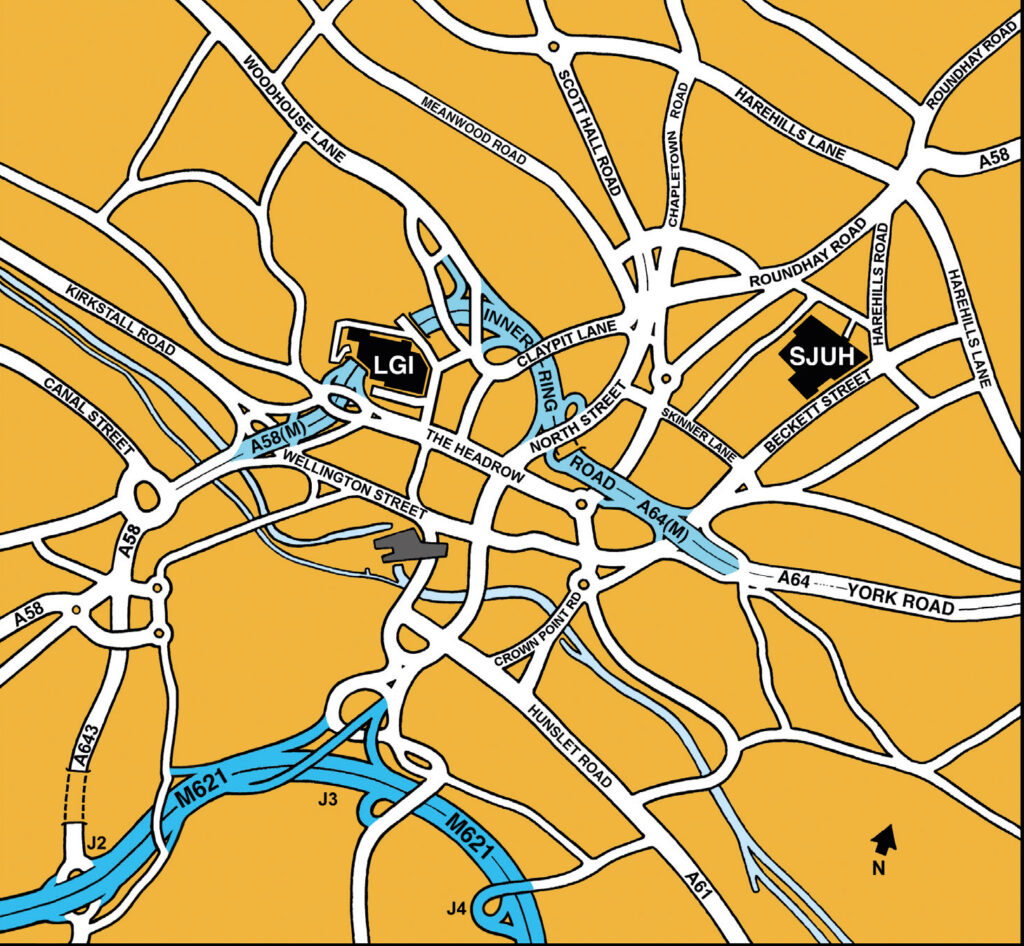
St James’s University Hospital – site plan
